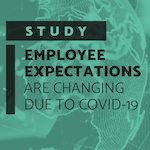 |
As the nation reopens, 83 percent of employees say that if their work can be done remotely, they should not be required to return to their offices until "COVID-19 is no longer a threat," according to a survey conducted by the Institute for Public Relations and The Harris Poll.
They also think they should have a say in when they come back to office, with 81 percent saying they should be allowed to work from home until they are comfortable with returning.
Most office workers do not want to be in an open office once they start commuting back in to work. Almost nine out of ten (87 percent) also feel that employers have a responsibility to have clear guidelines and procedures in place before on-site work begins again.
Eight out of ten respondents said that companies should move toward sectioned-off offices as a way to ensure social distancing. Nearly as many said that staggered work hours would help in the effort to maintain a safe distance between workers.
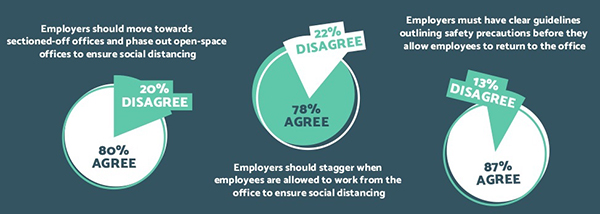 |
Survey respondents also think that employers should provide a range of protections once offices open back up. About three-quarters (74 percent) think that hand sanitizer should be made available, and over half think that PPE devices (masks/respirators) and temperature tests should be offered
They also think that their employers are obligated to provide certain benefits if workers contract COVID-19 once they return to the office, with 72 percent saying that paid sick leave should be offered. Other benefits mentioned were payment for COVID-19 testing (67 percent), coverage of hospital benefits (59 percent) and coverage for out-of-pocket medical expenses (57 percent).
With Congress considering reforms that would protect essential businesses from “unfair litigation related to COVID-19,” survey respondents had some conditions that would have to be met before they would support such legislation. Fifty-six percent said they were OK with such protections for “companies that are demonstrating how they are taking accountability for employee safety.
However, 11 percent said nothing would make them more likely to support increased legal protections for essential businesses.
The IPR/Harris Poll survey polled 831 full-time employees between May 15 and 17.


 Consumers who once demanded convenience now require consistent, multi-channel experiences that cater to them at every point. Brands must have a clear, audience-appropriate, and channel-specific voice across all platforms.
Consumers who once demanded convenience now require consistent, multi-channel experiences that cater to them at every point. Brands must have a clear, audience-appropriate, and channel-specific voice across all platforms.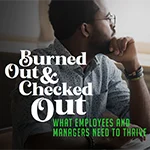 Employees at U.S. companies are experiencing high levels of burnout, but managers are lagging behind when it comes to their awareness of the problem
Employees at U.S. companies are experiencing high levels of burnout, but managers are lagging behind when it comes to their awareness of the problem Brand has a powerful effect on a company’s valuation, but the level of brand understanding in the investment community leaves a lot to be desired, according to a new study from Brodeur Partners, Interbrand and NewtonX.
Brand has a powerful effect on a company’s valuation, but the level of brand understanding in the investment community leaves a lot to be desired, according to a new study from Brodeur Partners, Interbrand and NewtonX.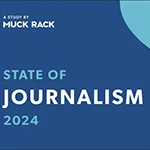 AI may still be viewed with a wary eye by most media pros, but its use is growing, according to a new study from Muck Rack.
AI may still be viewed with a wary eye by most media pros, but its use is growing, according to a new study from Muck Rack.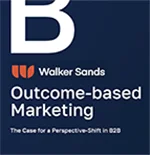 A new study from Walker Sands says that some marketers have been putting the cart before the horse when it comes to the relationship between marketing channels and business outcomes.
A new study from Walker Sands says that some marketers have been putting the cart before the horse when it comes to the relationship between marketing channels and business outcomes.


 Have a comment? Send it to
Have a comment? Send it to 
No comments have been submitted for this story yet.